The focus on where our food comes from, what’s in it and its impact on the environment has been at the forefront of our consciousness and part of a public dialogue for quite some time now. But we haven’t been having the same conversation about our clothing. Where does it come from, what is it made of and how might it affect the planet? In what’s become a throwaway, trend-dependent society, it’s not uncommon to wear things a few times and dispose of them without thinking about it. Gone are the days of hand-me-downs and mending clothes to extend their functionality.
Anna Hunter, co-director and co-founder of the Pembina Fibreshed — launched in January 2018 — wants to change that by increasing awareness and promoting action towards a more environmentally mindful world. Hunter, assisted by a growing number of volunteers, works to educate, advocate for and support fibre producers, manufacturers and dyers. The local affiliate is part of a larger organization in California that started in 2010, which offers strong leadership and a good template for the Manitoba group.
“I’ve been passionate about local textiles and regenerative organic farming for a very long time, and focused on how we consume clothing,” said Hunter, who owned a small yarn store in east Vancouver before moving to Manitoba and starting a sheep farm and the province’s only wool-processing mill.
To read more of this column first reported by the Winnipeg Free Press, click here.
This content is made available to Canada's National Observer readers as part of an agreement with the Winnipeg Free Press that sees our two trusted news brands collaborate to better cover Canada. Questions about Winnipeg Free Press content can be directed to [email protected].





Comments